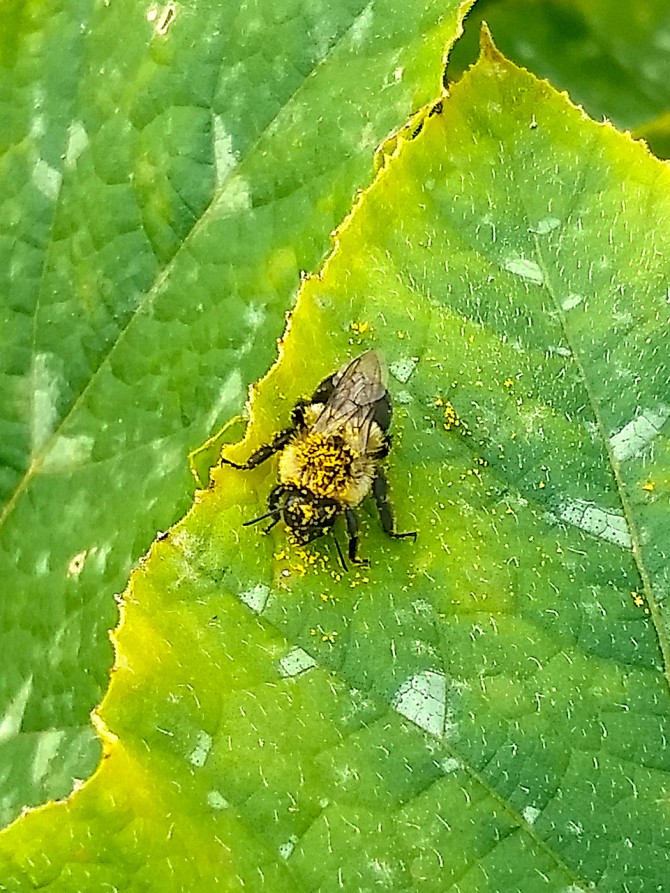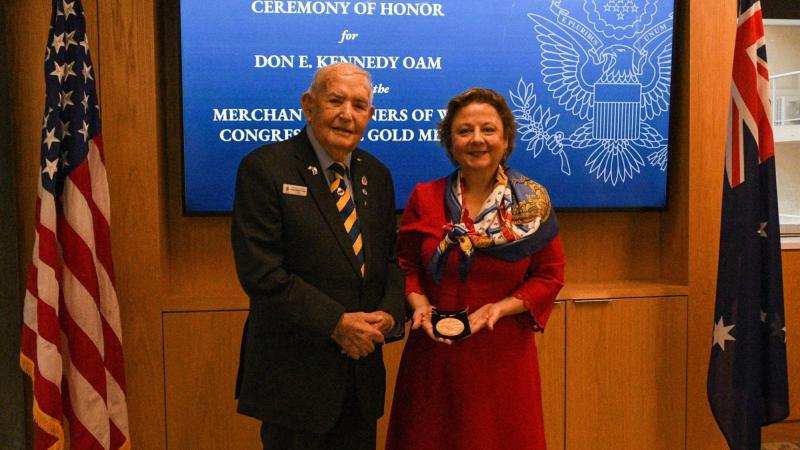When it comes to feeding on pollen, honeybees and bumblebees are generalists. They like a buffet of choices – except when it comes to pollen from flowers of the genus Cucurbita, including squash and pumpkin, which they avoid.
A Cornell study, “Pollen Defenses Negatively Impact Foraging and Fitness in a Generalist Bee,” published Feb. 20 in the journal Nature Scientific Reports, found that squash and pumpkin pollen have physical, nutritional and chemical defense qualities that are harmful to bumblebees.
A bumblebee on a leaf leaves a trail of cucurbit pollen behind her as she tries to remove it.
“When bumblebees are fed cucurbit pollen, it causes all kinds of problems,” said Bryan Danforth, professor of entomology and the paper’s senior author. “Adults have damaged and distorted digestive tracts and colonies fed cucurbit pollen failed to rear any offspring.”
Bumblebees do visit pumpkin and squash flowers for the nectar, and though they don’t collect the pollen, some might inadvertently get on their legs.
“I actually saw them in the field using their legs to groom it off their bodies and then wipe it on a leaf,” said first author Kristen Brochu Ph.D. ’18, a former Cornell doctoral student in Danforth’s lab and a postdoctoral researcher at Pennsylvania State University. “Not only are they not collecting it, they actually hate it.”
At the same time, another bee, the squash bee, eats only cucurbit pollen.
“The [cucurbit] system is really interesting because we have specialists and generalist bees feeding on the same resource,” Brochu said.
The results suggest that deterring bumblebees from collecting and eating pollen may provide an evolutionary benefit to cucurbit plants.
“Bees that are really effective at collecting and eating certain types of pollen may be actually functioning more like herbivores and pollen thieves than actual pollinators,” Brochu said. At the same time, bees that visit plants for nectar but don’t collect pollen may be good pollinators, as stray pollen on their bodies may end up pollinating the next flower.
“What this tells us is that some plant pollen may be chemically or mechanically protected from generalist bees which, oddly enough, can benefit the plants in terms of pollination,” Danforth said.
In the study, Brochu and colleagues created diets that represented different defenses to test which cucurbit pollen characteristics deterred bumblebees. One diet of wildflower pollen collected by honeybees served as a control. A second consisted of unadulterated cucurbit pollen, which is nutritionally poor food for bumblebees, has large and spiny grains, and contains natural chemicals. In a third treatment, the team extracted the chemicals from the cucurbit pollen and added them to the control diet of nutritionally rich wildflower pollen.
Microcolonies of five bees were each fed a separate treatment. The bees fed the wildflower pollen thrived, as expected. Under a natural cucurbit diet, the cumulative effect of the pollen’s physical defenses, poor nutritional content and chemicals led to bees ejecting their offspring from their brood cells and killing them. Bumblebees do this when stressed, possibly because they can’t take care of the larvae, Brochu said.
With the crushed pollen diet, where the pollen’s physical defenses were removed, eggs and larvae failed to mature. “Over the course of the 50 days of the experiment, in both the crushed and natural cucurbit treatment, no offspring made it to adulthood,” Brochu said.
In the crushed treatment, the adults also died at a higher rate, possibly due to a release of additional toxic chemicals. And with the chemical wildflower treatment, larvae made it to adulthood most of the time and the bees ate more, possibly to compensate for something in the chemicals, Brochu said. Their abdomens became hard and dark, a process called melanization, which indicated trauma to the guts.
“We tend to think that all pollen resources are great for all bees, but I don’t think that’s true,” Brochu said.
For the sake of bumblebees, she said, pumpkin and squash growers may think twice about bringing commercial bumblebees into their fields and may provide wildflower strips as alternative food sources.
Study co-authors include Brian Nault, professor of entomology at Cornell AgriTech, and Jessica Peterson, a former postdoctoral researcher in Nault’s lab who is an invertebrate ecologist at the Minnesota Department of Natural Resources. Nault and Peterson conducted initial research identifying how generalist bumblebees avoided gathering cucurbit pollen.
The study was funded by the Canadian Natural Sciences and Engineering Research Council; a U.S. Department of Agriculture National Institute of Food and Agriculture Hatch Grant; and the Griswold Fellowship, which supports graduate-student research in Cornell’s Department of Entomology.








